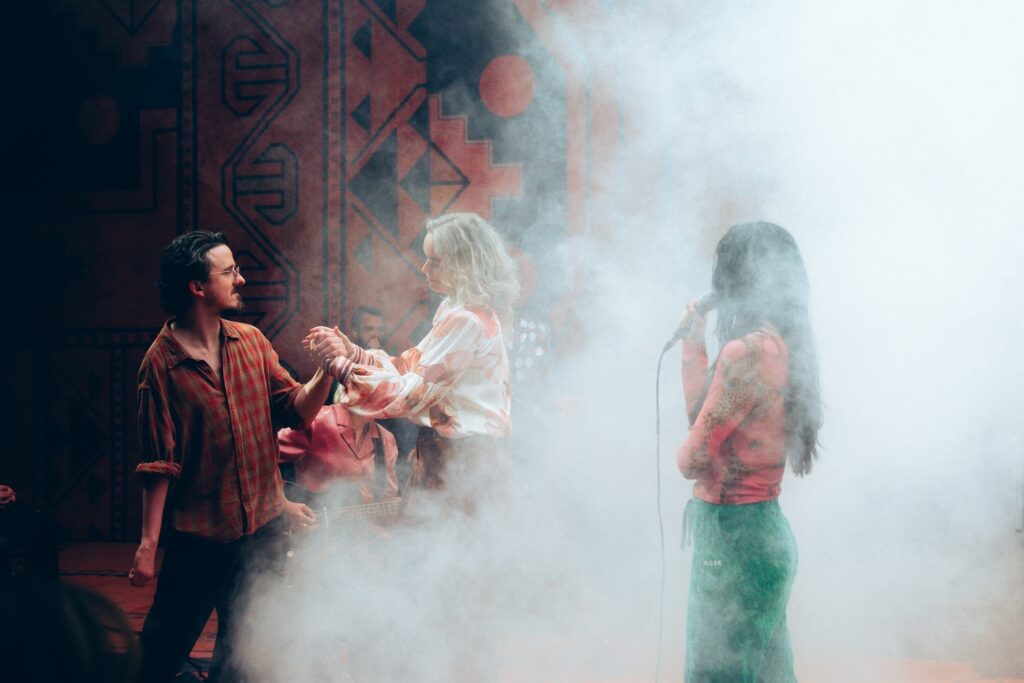Now at Brooklyn’s St. Ann’s Warehouse, a Most Raucous Presentation of Chekhov’s ‘The Cherry Orchard’
Written and helmed by Benedict Andrews, this new version aggressively captures the tragicomic elements that have always defined this classic: It’s about as subtle as the brightly colored, sometimes mismatched garb worn by its actors.

It’s shaping up to be quite a spring for Chekhov fans, particularly those who enjoy revisionist takes from abroad. Just weeks ago, a one-man adaptation of “Uncle Vanya” arrived from the U.K. Now, an Australian director and playwright, Benedict Andrews, known for his imaginative work with stars such as Cate Blanchett and Isabelle Huppert, has finally reclaimed “The Cherry Orchard” as the rip-roaring comedy its author always intended it to be.
At least, that’s what one might assume based on reviews this new production garnered last year, when it had its premiere at London’s Donmar Warehouse. Mr. Andrews’s staging, now being presented at Brooklyn’s St. Ann’s Warehouse, is without question as raucous a “Cherry Orchard” as any you’ve likely seen: A band, onstage through much of the second act, plays rock songs by Nick Cave and PJ Harvey, and Merle Haggard’s equally loud, contemporary costumes might have been acquired by raiding a thrift store.
Yet this new version, both written and helmed by Mr. Andrews, fully captures the tragicomic elements that have always defined this classic, however sober a given director’s vision. And by fully, I mean, in this case, aggressively, because this “Cherry Orchard” is about as subtle as the brightly colored, sometimes mismatched garb worn by its actors.
Happily, those actors, most of whom appeared in the Donmar production as well, are so facile, and so palpably committed, that they accommodate Mr. Andrews’s penchant for overstatement — and, more often than not, they also manage to mine the shades of gray in their characters.

A German actress whose various film and TV credits include “Tár” and “Homeland,” Nina Hoss, is ideally cast as Liubov Ranevskaya Adreevna, the owner of the orchard and the estate it sits on, and a symbol of Russia’s fading aristocracy. An elegant beauty without a pragmatic bone in her body, Ranevskaya has just arrived from Paris, where, true to her fashion, she spent like a sailor while keeping a needy lover.
The homecoming is fraught, to say the least: Ranevskaya’s flight from Russia, several years before, was precipitated by the drowning of her young son; her return follows a suicide attempt, and is further complicated by financial woes. Mired in debt, she is facing the prospect of having to sell her beloved orchard, and is being pressed to do so by one Yermolai Lopakhin, the son and grandson of serfs, who worked on the estate but is now a successful businessman.
Lopakhin is played by Adeel Akhtar, with a bracing cockney that’s among a smorgasbord of English, Irish, and Australian accents on offer here. His suit and shirt constitute one of the less garish outfits, though they’re adorned by flashy gold jewelry: rings on his fingers, chains on his neck and wrist, a bulky watch. He’s the very model of a nouveau riche boor, as Mr. Andrews emphasizes both through crass language and in his direction.
At one point, as Lopakhin descends into a drunken rage, Mr. Akhtar is called on to scream at the top of his lungs and stumble menacingly through the theater. Other performers interact even more closely with the audience, sitting in the first rows surrounding the stage on all four sides when not on it; during a recent preview, one woman, in what I assume is a regular gesture, was identified as a bookcase and drawn into the action.
Yet Mr. Akhtar also finds glimmers of tenderness and self-recrimination in his character. Repeatedly, I found myself taking advantage of his and the other players’ close proximity to look into their eyes and study their expressions, and was compelled by their emotional transparency and vigor.
Other standouts in the company include Michael Gould, droll and stirring in the role of Ranevskaya’s chatty, anxious brother, Leonid Gaev Andreevich; and Sadie Soverall, a constant ray of light as her restless daughter, Anya. Karl Johnson turns in the gentlest and, ultimately, most heartbreaking performance as Firs, an elderly servant whose devotion to Russia’s disintegrating class system is not, to put it mildly, rewarded by his social superiors.
Mr. Andrews’s antics, and those of his colleagues, threaten to overshadow them at times. I was especially bothered by the vaguely jazzy, dissonant music that continued to buzz under the dialogue through much of Act Two, as if the director and music supervisor and composer Zac Gvi were trying to underline or embellish the exchanges.
If you can withstand such excess, and appreciate the passion behind it, this “Cherry Orchard” will reward your patience — and, in the end, it will likely leave you as moved as many a more somber staging.

